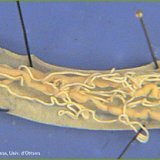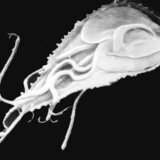Treatment of giardiasis in children
 Giardiasis is a common childhood disease that is parasitic in nature. It is usually not difficult to notice it. The child begins strong diarrhea, there is a loss of appetite. Sometimes diarrhea is accompanied by fever. These are alarming signals that should make you call a doctor.
Giardiasis is a common childhood disease that is parasitic in nature. It is usually not difficult to notice it. The child begins strong diarrhea, there is a loss of appetite. Sometimes diarrhea is accompanied by fever. These are alarming signals that should make you call a doctor.
Giardiasis is a disease that affects the gastrointestinal tract. Giardiasis is caused by a microscopic parasite of Giampia or Giardia. The parasite is attached to the mucosa of the human small intestine, where it sabotages the body's absorption of fats and carbohydrates from digested food. This explains the strong weight loss in the sick children. Treatment of giardiasis in children is strictly necessary.
Giardia is one of the main causes of diarrhea in the world. Transmission of parasites occurs through contaminated water. Lamblias survive even in chlorinated water and remain vital for two months in cold water. Even a dozen parasites in a glass of water can cause a serious case of giardiasis in a person who has drunk them.
The risk of lambliasis is three times higher in children than in adults. Experts believe that with age, the body acquires immunity to the parasite. The risk of the disease is higher in people with weakened health. Children and adolescents aged 11 to 18 fall into a special risk group.
Signs and symptoms of Giardiasis
According to the statistics, up to 20% of the population suffer from giardiasis. Lamblias are the main cause of childhood diarrhea. Interestingly, more than two-thirds of infected people do not have any symptoms or signs of the disease, despite the fact that the parasite is at this time in their intestines. This causes serious problems for timely diagnosis.
When lamblia causes symptoms, the disease begins with severe watery diarrhea without blood or mucus. Giardiasis affects the body's ability to absorb fat. Therefore, diarrhea contains undigested fats. The chair has a glossy fatty film and smells very bad.
Other symptoms include abdominal cramps, excessive gas production, loss of appetite, nausea and vomiting. Sometimes there is an increase in the total body temperature.
These symptoms can last from 5 to 7 days or longer. If they last longer, the baby may begin to lose weight. Sometimes, after an exacerbation, the symptoms of giardiasis pass and the disease becomes chronic.
Symptoms of chronic giardiasis include:
excessive gasification
abdominal pain in the navel area
poorly formed, liquid chair
There are a number of tips that will help protect your family from Giardiasis
Drink only boiled water. Try to avoid raw water from a common water canal and especially lake or river water.
Take your own water with you when you go camping or nature.
Wash raw fruits and vegetables before eating.
Wash your hands before starting to prepare food for yourself or your family.
Encourage children to wash their hands after each trip to the toilet and especially before eating. If someone in your family suffers from Giardiasis, wash your hands after each contact with it.
Aquariums are a potential source of Giardiasis. If the child touched water or fish in it, be sure to get him to wash his hands properly.
Be careful when visiting public pools. Consult the owner about the measures taken to clean the water.
Infectiousness of Giardiasis
Humans and animals suffer from giardiasis through a stool. Getting into sources of public water supply, Giardia can cause epidemic of the disease. Products washed with contaminated water can also be a spreader of the infection.
Giardiasis can be transmitted from person to person with direct contact. A parasite can infect a person and in contact with infected animals. If there are small children and animals at home, be sure to check with the veterinarian for a parasite.
Doctors confirm the diagnosis of giardiasis by taking samples of feces and sending them to the laboratory for a comprehensive check for lamblia. It may be necessary to take several samples to detect parasites. This is another difficulty for timely diagnosis.
Less often, doctors diagnose after examination of the small intestine with a device called an endoscope. With this method, the sample is taken directly inside the intestine. The procedure is performed only in extreme cases, when the symptoms of the disease are present, but the tests show a negative result.
Treatment of Giardiasis
Giardiasis is treated with drugs that kill parasites. Usually treatment takes from five to seven days. Preparations are given to the child in a liquid form. Be aware that some drugs have side effects. The doctor usually warns about them in advance.
If the child is diagnosed with Giardiasis and treatment is prescribed, make sure that the child takes all the medications exactly according to the schedule from the prescription. This will help the child to get rid of parasites as soon as possible and not infect other members of your family. Again, I encourage all family members to wash their hands often, especially after going to the toilet and before eating.
During diarrhea, the baby's body can lose too much fluid, which leads to severe dehydration. Get your child to drink more fluids. It can be juices or tea. Do not give him caffeinated drinks. They cause the body to lose water faster.
During treatment, avoid taking laxatives. They hide the symptoms of the disease and may interfere with treatment.
Duration of Giardiasis
The incubation period for giardiasis is 1 to 3 weeks after contact with the parasite. In most cases, treatment lasts from five to seven days. This time is enough to destroy the parasites. If lambliasis is not treated, symptoms can persist for up to two months and longer.
When to call a doctor
Call a doctor when your child has:
Severe diarrhea accompanied by fever.
Abdominal pain.
Sensitive diarrhea, which does not go away for several days and is accompanied by a poor appetite.
The child loses weight and badly eats.



